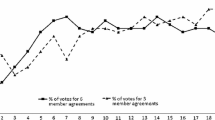Abstract
In collaborative negotiation, stakeholder representatives are charged with the development of a mutually acceptable set of public policies. Although this approach has become popular in environmental negotiations, little is known about the characteristics of the outcomes that are reached. In this paper, we employ an Edgeworth box framework to investigate the nature of bargaining over public goods (environmental policies) that have multiple attributes. We then design and conduct laboratory experiments within this framework to test whether negotiated outcomes satisfy standard axiomatic bargaining predictions under a variety of conditions. Specifically, we test whether two parties with Pareto inefficient endowments of two goods will trade to Pareto improving and Pareto efficient outcomes, and to the Nash bargain in particular. We vary whether the Nash bargain coincides with or diverges from the outcome that maximizes the joint payoff, or the outcome that equalizes payoffs, and whether subjects are provided full or partial information. We find that bargainers reach Pareto improving and efficient outcomes across treatments, but withdraw support for the Nash bargain when it generates unequal payments or when payoff information is private. We conclude that this experimental framework offers a promising method for studying multi-attribute negotiations.
Similar content being viewed by others
References
Aengst P, Anderson J, Chamberlin J et al (1997) Introduction to conservation planning. Endanger Spec Update 14: 5–9
Amy D (1987) The politics of environmental mediation. Columbia University Press, New York
Bruce C (2006) Modelling the environmental collaboration process: a deductive approach. Ecol Econ 59: 275–286
Camerer C (2003) Behavioral game theory. Princeton University Press, Princeton
Clark J (1998) Fairness in public good provision: an investigation of preferences for equality and proportionality. Can J Econ 31: 708–729
Clifford H (2002) Last dance for the sage grouse?. High Ctry News 34(Feb 4): 8–12
Coglianese C (1997) Assessing consensus: the promise and performance of negotiated rulemaking. Duke Law J 46: 1255–1349
Crowfoot J, Wondolleck J (1990) Environmental disputes. Island Press, Washington
Davis D, Holt C (1993) Experimental economics. Princeton University Press, Princeton
Fisher R, Ury W (1991) Getting to Yes. Penguin Books, New York
Harrison G, McKee M (1985) Experimental evaluation of the Coase theorem. J Law Econ 28: 653–670
Harter P (1982) Negotiating regulations: a cure for malaise. Ga Law J 71: 1–113
Hoffman E, Spitzer M (1982) The Coase theorem: some experimental tests. J Law Econ 25: 73–98
Hoffman E, Spitzer M (1985) Entitlements, rights, and fairness: an experimental examination of subjects’ concepts of distributive justice. J Leg Stud 14: 259–298
Hoffman E, Spitzer M (1986) Experimental tests of the Coase theorem with large bargaining groups. J Leg Stud 15: 149–172
Holt C, Laury S (2002) Risk aversion and incentive effects. Am Econ Rev 92: 1644–1655
Koontz T, Steelman T, Carmin J et al (2004) Collaborative environmental management. Resources for the Future, Washington
Montet C, Serra D (2003) Game theory and economics. Palgrave MacMillan, Hampshire
Murninghan J, Roth A, Schoumaker F (1988) Risk aversion in bargaining: an experimental study. J Risk Uncert 1: 101–124
Nash J (1950) The bargaining problem. Econometrica 18: 155–162
Nydegger R, Owen G (1975) Two-person bargaining: an experimental test of the Nash axioms. Int J Game Theory 3: 239–249
Pritzker D, Dalton D (1995) Negotiated rulemaking sourcebook. Administrative Conference of the United States, Washington
Rhoads T, Shogren J (2003) Regulation through collaboration: final authority and information symmetry in environmental Coasian bargaining. J Reg Econ 24: 63–89
Roth A (1995) Bargaining experiments. In: Kagel J, Roth A (eds) The handbook of experimental economics. Princeton University Press, Princeton, pp 253–348
Roth A, Malouf M (1979) Game-theoretic models and the role of information in bargaining. Psychol Rev 86: 574–594
Roth A, Schoumaker F (1988) Expectations and reputations in bargaining: an experimental study. Am Econ Rev 73: 362–372
Roth A, Malouf M, Murningham J (1981) Sociological versus strategic factors in bargaining. J Econ Behav Org 2: 153–177
Schelling T (1960) The strategy of conflict. Harvard University Press, Cambridge
Spence D, Gopalakrishnan L (2001) The new political economy of regulation: looking for positive sum change in a zero sum world. In: Orts E, Deketelaere K (eds) Environmental contracts: comparative approaches to regulatory innovation in the United States and Europe. Kluwer, New York, pp 305–332
Tableman M (1990) San Juan National Forest mediation. In: Crowfoot J, Wondolleck J (eds) Environmental disputes. Island Press, Washington, pp 32–65
Wondolleck J, Yaffee SL (2000) Making collaboration work. Island Press, Washington
Author information
Authors and Affiliations
Corresponding author
Additional information
Funding for this research was provided by the Donner Canadian Foundation and the College of Business and Economics of the University of Canterbury. We would like to thank two anonymous referees plus David Dickinson, Mike McKee, Francisco Gonzalez, Marian Miles, Chris Auld, and Steven Tucker for their suggestions.
Rights and permissions
About this article
Cite this article
Bruce, C., Clark, J. The Efficiency of Direct Public Involvement in Environmental Policymaking: An Experimental Test. Environ Resource Econ 45, 157–182 (2010). https://doi.org/10.1007/s10640-009-9310-8
Received:
Accepted:
Published:
Issue Date:
DOI: https://doi.org/10.1007/s10640-009-9310-8




